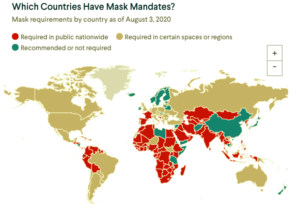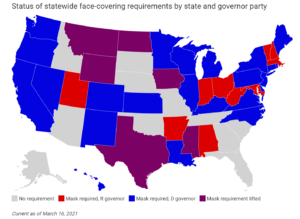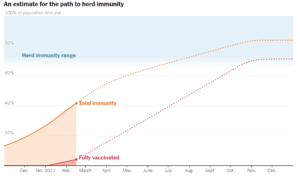
Photo Credit: Frauke Riether from Pixabay
Released March 14, 2021
Download PDFCOVID-19 Mask Mandates & Vaccine Mandates: Does the federal government have the power to implement these policies?
by Sevion DaCosta ’21, Tara Mehra ’22, Marshall Bessey ’22
As President Joe Biden assumes office after a contentious election and transition, the focus shifts back to two important aspects of daily life: the economy and COVID-19 response. A divided Congress has just worked through Biden’s proposed stimulus package. Please read our CARES Package report here,[1] to learn more about the first stimulus package passed, and its impact on state and local government. Federal and state governments will continue to play important roles in the distribution of Coronavirus vaccines in the coming months. This paper explores, using a theoretical approach based on current circumstances, the questions regarding the constitutionality of a national mask and vaccinations mandate. The focus will be on the federalism legal arguments for and against a national mask mandate and will be extrapolated to include vaccine mandates and what one may see in exigent circumstances.
Since as early as December 2019 the COVID-19 pandemic has been infecting people across the United States.[2] As of March 5, 2021, there have been over 28 million cases and over 519,000 deaths recorded in the United States.[3] California alone has seen nearly 3.5 million cases and 50,000 deaths attributed to COVID-19.[4] Consequently, many states and local jurisdictions have responded with stay-at-home orders, mask mandates, and other regulations that attempt to limit the spread of COVID-19. After an initial few weeks in March and April, President Trump largely criticized stay-at-home orders on the grounds that such orders hurt businesses and workers.[5] Trump stated that a combination of responses to the virus by different states had a negative impact on the economy, and focused on creating guidelines for “Opening Up American Again” across America.[6] In the middle two weeks of March 2020, employment fell by 30 million and triggered a recession.[7] While Trump did close down borders to many foreign travelers, states within the US set their own restrictions. Trump did not attempt to impose a national mask mandate as seen in many other countries.[8] The figure below depicts those nations which required mask-wearing in August 2020 according to the Council on Foreign Relations:
Figure 1.

Source: https://www.cfr.org/in-brief/which-countries-are-requiring-face-masks
As of March 16, 2021, 33 states mandated mask-wearing in the United States.[9] In addition, the District of Columbia and Puerto Rico also have mask mandates. The figure below displays the states with statewide facial covering requirements and the party of their respective governor:[10]
Figure 2.

Source: https://ballotpedia.org/State-level_mask_requirements_in_response_to_the_coronavirus_(COVID-19)_pandemic,_2020-2021
After a sharp increase in COVID-19 cases in November, the US faced a harsh winter; January marked the pandemic’s deadliest month in the US, with at least 95,245 recorded deaths.[11] Since then, the infection rate has been dropping within the United States. Between mid-January and the end of February, new infections decreased by almost 70%.[12] Accordingly, some states have adjusted their policies regarding mask-wearing and business restrictions. For example, Texas Governor Greg Abbott has put into order, effective March 10th, that he will be lifting the state’s mask mandate and fully opening businesses – citing in part recoveries and reduced hospitalizations, and vaccine rollout, as reasons for the re-opening.[13]
Figure 3.[14]

Source: https://www.nytimes.com/interactive/2021/02/20/us/us-herd-immunity-covid.html
Figure 3 illustrates the growing immunity to COVID-19 within the United States, attributed in part to vaccinations and in larger part to antibody immunity. The chart predicts an increase in the rate of vaccination and consequently the proportion of US residents with immunity to COVID-19, making herd immunity in sight.[15] State policies will shift depending on the success and speed of vaccine rollout plans. Therefore, we will look at the legal question of whether or not the President or Congress can enact a nationwide mask and/or vaccine mandate.
Furthermore, the transition from the Trump Administration to Biden in January marked a change in the US policies directed at COVID-19 response. During their respective campaigns, Donald Trump and Joe Biden expressed different visions for how to manage the COVID-19 pandemic (though there were also several practical similarities). Among other things, President Trump was opposed to a national mask mandate, and at a presidential debate, remarked that he only wore a mask when “needed.”[16] However, President Biden promised he would take a stronger stance on enforcing mask-wearing throughout the United States and seemed determined to impose, perhaps de-facto, a national mask mandate.[17] Although he has conceded that a sweeping national “mask-mandate” executive order would exceed his presidential authority, he believes that he can effectively achieve national mask-wearing. President Biden aimed to combine his power over federal lands with federalism tactics to encourage governors or local officials to enforce mask mandates.[18] So far, Biden has signed orders to mandate mask-wearing on federal property and for interstate travelers.[19] Section 3 of Executive Order on Protecting the Federal Workforce and Requiring Mask-Wearing, is focused on “encouraging masking across America” with the “goal of maximizing mask-wearing and other public health best practices identified by the CDC.”[20]
Trump and Biden also differed in their handling of the vaccine rollout. For example, the Trump Administration withheld vaccine doses in order to ensure that all Americans vaccinated would also receive the necessary booster shot.[21] By contrast, Biden planned to release all available doses of the COVID-19 vaccine.[22] Biden supports increased state funding and has launched programs like the Federal Retail Pharmacy Program to “expand equitable access to vaccines for the American public.”[23] However, the state rollout of vaccines has been somewhat slow; as of February 11, just 68% of vaccines delivered to states had been used.[24] While public-private partnerships instituted by Biden may help increase the rate of vaccination, much of the burden lies on the states. Biden has announced that his administration will make every adult in the United States eligible for a vaccination no later than May 1st.[25]
Biden’s remarks regarding a national mask mandate raise important constitutional questions regarding the scope and limits of federal authority in the midst of what could be considered a national health emergency. During such a crisis, to what extent can the national government limit a state’s police power? Can a combination of congressional and executive action achieve the sort of sweeping mandate that Biden envisions? And how might state or local governments resist orders that infringe on their sovereignty? In the case of national mandates, there is a conflict between public health, civil liberties, and state sovereignty.
Past Supreme Court opinions have implications for how a national mandate might interact, or even conflict, with state powers. Most notable in the context of a health emergency is Jacobson v. Massachusetts (1905), a case that emerged during a small-pox outbreak in the early 1900s. At issue in the case was the constitutionality of a Massachusetts statute that permitted cities to institute mandatory vaccination laws “when necessary for public health or safety.”[26] The city of Cambridge’s board of health issued a mandate. Henning Jacobsen, a resident of Cambridge and the plaintiff in this case, received a fine for refusing to take the vaccination. Jacobsen sued on the grounds of personal liberty in the 14th Amendment, emphasizing that his refusal to take the vaccine stemmed from adverse reactions to previous vaccines.[27] Importantly, the Massachusetts Supreme Court noted that the state and city laws were acceptable because nobody would be “forced” to take the vaccine; refusal for vaccination resulted in a fine worth approximately $135 dollars today.[28]
Jacobson appealed the decision to the U.S. Supreme Court. Overall, the Court ruled in favor of the constitutionality of the Massachusetts statute that authorized a city board of health to impose a vaccination mandate through the state’s police power.[29] Additionally, because the local board of health deemed the vaccination “necessary for public health or safety,” the Massachusetts law was determined legitimate and reasonable.[30]
While Jacobson does not address national mandates or mask mandates, the precedent established is certainly relevant. First, the opinion affirmed that the state retains all power that it had not ceded to the federal government in the Constitution, including the ability to legislate within its bounds.[31] This affirmation suggests that any national mandate will risk an unconstitutional usurpation of state police power. Further, the necessity of the approval of the Board of Health for the law to be considered reasonable suggests that on the national level, such a sweeping mandate would need the support and legitimacy from public health actors. The effectiveness of masks, vaccines, and stay-at-home orders would need to be proven for their respective legitimacy in a mandate. Sufficient scientific evidence that masks are clearly effective would be needed to withstand judicial scrutiny. At this current time, the evidence shows that mask-wearing reduces transmission of COVID-19 infected respiratory particles, and it is deemed most successful when compliance is high.[32] However, the winter surge in COVID-19 cases coincided with high levels of mask-wearing which undermines the evidence of masks’ effectiveness. The high compliance of mask-wearing during the winter surge may prove to be a judicial hurdle if a national mandate is implemented. This is because some of the existing data on the effectiveness of masks are limited as a byproduct of masking occurring in conjunction with other interventions such as social distancing.[33]
The other important legal precedent from Jacobson v. Massachusetts is regarding vaccinations. As the U.S. sees one-third of the military eligible to receive the vaccine decline COVID-19 vaccine,[34] and many front-line workers refusing to take the vaccine[35] can there be a national mandate?
In the case of vaccines, the answer derived from Jacobson is no. There can be a penalty involved but it must be essential that the penalty for refusing vaccination was not so great that it effectively coerced, or forced, residents to take the vaccine. Also, case law from the past century, including Jacobson v. Massachusetts (1905) and Breit haup v. Abrams (1957),[36] have strengthened the idea of a “right to refuse” stemming from the sphere of liberty within the 14th Amendment.[37]
In discussing a state’s police power, the majority opinion in Jacobson also states that “a local enactment or regulation, even if based on the acknowledged police power of a State, must always yield in case of conflict with the exercise by the General Government of any power it possesses under the Constitution . . .”[38] The limitation to state power is especially telling in relating the disputes in Jacobson to those that might arise during Biden’s presidency. Drawing on national supremacy, the majority asserts that the state police power holds authority unless it is at odds with a national law that is made in pursuance of the Constitution. Thus, although a national mandate could take precedent over state regulation, the power to impose such national regulation must derive from the Constitution.
It is also important to note key differences between the circumstances of Jacobson and those that the US is currently facing due to the COVID-19 pandemic. The outbreak being addressed in Jacobson was determined to be local re-emergence of smallpox.[39] The local nature of the outbreak affirms that it is a problem confined within the state’s boundaries. By contrast, COVID-19 is an ongoing national and international pandemic that has not been eradicated.[40] While the ubiquity of COVID-19 in the U.S. may not detract from a state’s power, it raises the possibility the federal government may have enhanced jurisdiction to handle the pandemic.
Biden has already conceded that his executive authority alone would not be enough to impose a mask mandate beyond federal property and interstate travel. He does not plan to pursue a national vaccine mandate.[41] Despite the lack of present action in the continued pursuit of a sweeping mask mandate, it is important to theoretically understand how such a mandate could function constitutionally. A sweeping national mask mandate would require more than just presidential action to be legal. Although, as Jacobson v. Massachusetts suggests, a mandate could easily be found unconstitutional due to a usurpation of state police powers, there are several avenues that may be explored to argue for the constitutionality of a sweeping mandate.
State police powers give state and local governments the primary responsibility in controlling the spread of disease; but under the commerce clause in Article I, Sec. 8, the national government has the power to regulate interstate commerce.[42] According to a recent report regarding the balance of state and federal power from the Congressional Research Service, “the federal government may assist state efforts to prevent the spread of communicable diseases if requested by a state or if state efforts are inadequate to halt the spread of the disease.”[43] The claim of “inadequate state efforts” from the national government may give leeway into further regulation, especially as states (like Texas) continue to re-open and drop relevant mandates. President Biden also considered imposing domestic travel restrictions on Florida as strands of the new highly contagious – B.1.1.7 – COVID-19 mutations surged in the state. [44] Governor Ron DeSantis vocally opposed any consideration of travel restrictions, stating that he believes any travel ban on Florida would be “unconstitutional.[45]
Like Jacobson insisted, state and local regulation must yield to the General Government if the General Government is acting in pursuance of its enumerated powers. In this case, Congress’s power to regulate under the commerce clause comes into question. Congress has the authority to regulate interstate commerce. The national government may claim that a national mandate would be constitutional under the commerce clause because of the impact of an untempered virus or the potential for new variants to flourish as states reopen. If many states have “inadequate” containment efforts that perpetuate local lockdowns, the national government could presumably claim that imposing a national mandate would protect the national economy.
However, Congress could conversely try to justify a statute that gives businesses the right to reopen on the basis that intrastate economic activity collectively has a “substantial effect” on the national economy and interstate commerce.[46] Therefore, local lockdowns that collectively impact the national economy and interstate commerce are within the federal government’s purview.[47]
Current litigation for related cases suggests that a constitutional claim – on the basis of the commerce clause – would be challenged. In 2012, the court heard NFIB v. Sebelius, which challenged, in part, the individual mandate provision of the Affordable Care Act. The individual mandate required every uninsured American to purchase health insurance coverage or face a monetary penalty, with some exceptions. While the plaintiffs argued that the individual mandate provision surpassed Congress’s authority to regulate under the interstate commerce clause, the individual mandate provision was ultimately upheld. The Court reasoned that the penalty for not purchasing insurance could be seen as a “tax,” and therefore falls under Congress’s taxing power. However, the forthcoming case California v. Texas further challenges the individual mandate provision. In 2017, the monetary penalty was reduced to zero dollars. Plaintiffs in the forthcoming case claim that the elimination of the penalty makes the prior tax argument moot. Without being linked to Congress’s power to tax, the individual mandate may be found unconstitutional, though oral arguments from November 2020 suggest that justices lean towards accepting its constitutionality.[48]
The type of mandate found in NFIB is quite distinct from what may emerge in the coming year amid the COVID-19 pandemic. Nonetheless, the continued litigation surrounding the ACA’s individual mandate suggests that the commerce clause alone may not be enough to uphold any mandate on individuals that the federal government issues. Without a doubt, Congress would see legal challenges to such a mandate, both on a basis of individual liberty and state sovereignty, as evidenced by Jacobson and NFIB.
Congressional action aside, Biden may attempt to combine different executive authorities to effectively issue a sweeping mandate. One such possibility lies in the Public Health Service Act. Section 361 (42 U.S. Code § 264) of the PHSA authorizes the Secretary of Health and Human Services to enact and enforce regulations “necessary to prevent the introduction, transmission, or spread of communicable diseases from foreign countries into the States or possessions, or from one State or possession into any other State or possession.”[49]
However, this authority may only be carried out in relation to diseases for which the President has issued an executive order.[50] Thus, theoretically, the combination of the Presidential executive order and the Secretary of Health and Human Services authority could support national containment efforts. The statute also delegates responsibility to the CDC to “prevent the introduction, transmission, or spread, of communicable diseases from foreign countries into the States or possessions, or from one State or possession into any other State or possession.”[51] However, experts believe that Section 361 would have to be read broadly to give executive authority for national mandates. Josh Blackman, a South Texas College Law Professor specializing in Constitutional Law, stated “I don’t think the statute can be read broadly enough to apply to all people merely moving on an interstate highway. Once you go beyond federal facilities, you’re really intruding on what the state’s responsible for.”[52] Thus, like congressional action, sweeping executive action would result in inevitable legal challenges, specifically from states that have limited regulation in relation to the COVID-19 pandemic.
However, on the basis of mandatory quarantines, we can turn to Globe School District No. 1 v. Board of Health, 20 Ariz. 208, Ariz. Supreme Court (1919).[53] This case provides the stare decisis to prove that state and local governments’ stay-at-home orders can be lawful if they help to prevent the spread of disease. This case specifically refers to state and local governments and does not prove that the federal government has the right to create a quarantine mandate. In Biden’s Executive order, regarding COVID-19 Safety in Domestic and International Travel, the power of implementing a policy that aligns with the CDC recommended self-quarantine and self-isolation after flights are determined by the Secretary of HHS, in coordination with the Secretary of Transportation.[54]
Without the authority to enact a sweeping national mandate, President Biden will likely attempt to incentivize state governors to adopt relevant mandates. In doing so, he must tread the line between “encouragement” and “coercion.” The former is a viable tool of the federal system, whereas coercing states into cooperating with federal “priorities” has been declared unconstitutional in many cases, including the aforementioned NFIB v. Sebelius.[55] If state governors will not comply with the national priorities, the national government may provide similar incentives to local governments. In encouraging state and local governments, the national government may provide federal funding on the condition that the state or local governments adopt specific containment policies.[56]
Endnotes
[1] https://roseinstitute.org/covid-19-the-cares-act-and-state-and-local-government/
[2] https://www.cdc.gov/mmwr/volumes/69/wr/mm6922e1.htm
[3] https://covid.cdc.gov/covid-data-tracker/#datatracker-home
[4] https://covid19.ca.gov/state-dashboard/
[5] https://roseinstitute.org/covid-19-the-cares-act-and-state-and-local-government/; https://www.nytimes.com/2020/03/23/business/trump-coronavirus-economy.html
[6] https://roseinstitute.org/covid-19-the-cares-act-and-state-and-local-government/; https://www.nytimes.com/2020/03/23/business/trump-coronavirus-economy.html
[7] https://www.brookings.edu/bpea-articles/epidemiological-and-economic-effects-of-lockdown/; https://thehill.com/opinion/finance/520547-the-lockdowns-greater-economic-impact
[8] https://www.cfr.org/in-brief/which-countries-are-requiring-face-masks
[9]https://ballotpedia.org/State-level_mask_requirements_in_response_to_the_coronavirus_(COVID-19)_pandemic,_2020-2021
[10]https://ballotpedia.org/State-level_mask_requirements_in_response_to_the_coronavirus_(COVID-19)_pandemic,_2020-2021
[11] https://www.cnn.com/2021/02/01/world/coronavirus-newsletter-02-01-21-intl/index.html
[12]https://www.npr.org/sections/health-shots/2021/02/26/969175478/u-s-coronavirus-infections-are-way-down-can-we-keep-them-that-way
[13] https://gov.texas.gov/news/post/governor-abbott-lifts-mask-mandate-opens-texas-100-percent
[14] https://www.nytimes.com/interactive/2021/02/20/us/us-herd-immunity-covid.html
[15] https://www.nytimes.com/interactive/2021/02/20/us/us-herd-immunity-covid.html
[16] https://www.nytimes.com/2020/10/29/us/politics/trump-biden-mask-mandate.html; https://www.nytimes.com/2020/10/02/us/politics/donald-trump-masks.html
[17] https://www.nytimes.com/2020/10/29/us/politics/trump-biden-mask-mandate.html
[18] https://abcnews.go.com/Politics/wireStory/latest-biden-game-person-debate-safe-73432288
[19]https://www.whitehouse.gov/briefing-room/presidential-actions/2021/01/20/executive-order-protecting-the-federal-workforce-and-requiring-mask-wearing/; https://www.health.com/condition/infectious-diseases/coronavirus/federal-property-interstate-travel-mask-mandates
[20]https://www.whitehouse.gov/briefing-room/presidential-actions/2021/01/20/executive-order-protecting-the-federal-workforce-and-requiring-mask-wearing/;
[21]https://www.cnbc.com/2021/01/08/covid-vaccine-biden-plans-to-release-more-doses-breaking-with-trump-policy.html
[22] https://www.nytimes.com/2021/01/08/us/politics/biden-coronavirus-vaccinations.html
[23] https://www.whitehouse.gov/briefing-room/statements-releases/2021/02/02/fact-sheet-president-biden-announces-increased-vaccine-supply-initial-launch-of-the-federal-retail-pharmacy-program-and-expansion-of-fema-reimbursement-to-states/
[24] https://www.nytimes.com/interactive/2021/02/12/us/vaccine-doses-distribution.html
[25]https://www.whitehouse.gov/briefing-room/statements-releases/2021/03/11/fact-sheet-president-biden-to-announce-all-americans-to-be-eligible-for-vaccinations-by-may-1-puts-the-nation-on-a-path-to-get-closer-to-normal-by-july-4th/
[26] https://www.ncbi.nlm.nih.gov/pmc/articles/PMC1449224/
[27] https://www.ncbi.nlm.nih.gov/pmc/articles/PMC1449224/
[28] https://www.ncbi.nlm.nih.gov/pmc/articles/PMC1449224/
[29] https://www.oyez.org/cases/1900-1940/197us11
[30] https://supreme.justia.com/cases/federal/us/197/11/
[31] https://www.ncbi.nlm.nih.gov/pmc/articles/PMC1449224/
[32] https://www.pnas.org/content/118/4/e2014564118
[33]https://www.idsociety.org/covid-19-real-time-learning-network/infection-prevention/masks-and-face-coverings-for-the-public/
[34] https://www.cnn.com/2021/02/17/politics/military-covid-vaccinations/index.html
[35]https://www.nbcnews.com/news/us-news/many-frontline-workers-refuse-covid-19-vaccines-distribution-rollout-struggles-n1252617
[36]https://www.law.cornell.edu/supct/html/88-1503.ZO.html#:~:text=The%20Fourteenth%20Amendment%20provides%20that,inferred%20from%20our%20prior%20decisions.
[37] https://www.ncbi.nlm.nih.gov/pmc/articles/PMC1651109/
[38] https://supreme.justia.com/cases/federal/us/197/11/
[39] https://www.cdc.gov/smallpox/history/history.html
[40] https://www.who.int/emergencies/diseases/novel-coronavirus-2019
[41] https://www.bbc.com/news/world-us-canada-55193939
[42] https://fas.org/sgp/crs/misc/RL33201.pdf
[43] https://fas.org/sgp/crs/misc/RL33201.pdf
[44] https://www.miamiherald.com/news/coronavirus/article249154715.html
[45]https://www.politico.com/states/florida/story/2021/02/11/defiant-desantis-blasts-biden-administration-amid-report-of-travel-limits-1362853
[46] https://crsreports.congress.gov/product/pdf/LSB/LSB10469
[47] https://crsreports.congress.gov/product/pdf/LSB/LSB10469
[48] https://www.nytimes.com/2020/11/10/us/supreme-court-obamacare-aca.html
[49] https://uscode.house.gov/view.xhtml?req=(title:42%20section:264%20edition:prelim)
[50] https://fas.org/sgp/crs/misc/RL33201.pdf
[51] https://crsreports.congress.gov/product/pdf/LSB/LSB10530, https://uscode.house.gov/view.xhtml?req=(title:42%20section:264%20edition:prelim)
[52] https://www.cnn.com/2020/11/01/politics/mask-mandate-fact-check/index.html
[53] https://www.ravellaw.com/opinions/69eba12270050c9723f47b064aa07593
[54]https://www.whitehouse.gov/briefing-room/presidential-actions/2021/01/21/executive-order-promoting-covid-19-safety-in-domestic-and-international-travel/
[55] https://www.oyez.org/cases/2011/11-393
[56] https://www.cnn.com/2020/11/01/politics/mask-mandate-fact-check/index.html

Sorry, comments are closed for this post.